|
.
|
|
|

|
|
|
|
|
|
.
|
  1 2 3 4 5 6 7 1 2 3 4 5 6 7
<
Page 2 of 7 >
|
|
Editor's
Notes:
|

|
|
<> By
clicking on a particular photo (or the
corresponding magnifying icon), an
enlarged version will appear.
|
|
<>
The
English text below is a translation from
the original Romanian
text
received and posted
|
|
<>
Additional translations are being sought
... We have posted so far:
|
|
|
|
.
IV.
Disembarkation From Train
(Coborarea
din Vagoane)
|
|
|

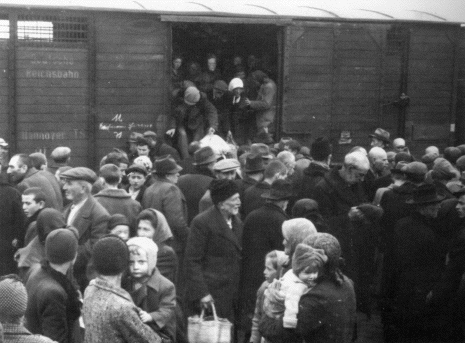
|
|
[IV-1]
The train stopped. The locked doors of the cars are
being opened. Each time, with no exception, in
front of each opened door, you would hear over and
over again the same two commands:
The
First One: Alle heraus! (Everybody out!)
The
words pleased us. We could now breathe with
ease.
The
Second One: Alles dort lassen!
(Leave everything there!)
(All luggage stays in the car.)
That
2nd command stunned us:
How
come EVERYTHING ... all luggage? ... and the
worm winter clothes? ... and the bed linen? ...
and the baby diapers? ... and the leftover food?
... and the family pictures and the books? ...
and the last water bottle? ... and the pouch
with medicine? ...
But
no time existed for such questions much less for
answers.
The
disembarkation had began.
(The
Original Text in Romanian)
Trenul
s-a oprit. Usile ferecate ale vagoanelor au fost
date in laturi. De fiecare data, fara exceptie, in
fata fiecarei usi s-au strigat, mereu si mereu,
aceleasi doua comenzi:
Prima:
Alle heraus! (Toti afara!). Cuvintele ne-au
bucurat. Am rasuflat cu totii usurati.
A doua: Alles dort lassen! (Lasati totul pe
loc!) (Toate bagajele raman in vagon). Aceasta a
doua comanda ne-a naucit:
Cum
adica TOTUL, toate bagajele...? ... si hainele
calduroase pentru iarna, si lenjeria de pat si
scutecele pentru copii si ramasitele de alimente si
pozele de familie si cartile si ultima sticla cu
apa si trusa de medicamente...
Dar
nu era timp pentru intrebari si, cu atat mai putin,
pentru raspunsuri.
Incepuse
coborarea.
|
|
 For
the Danish
translation
[Dansk
oversættelse],
please
click in on the icon at left.
For
the Danish
translation
[Dansk
oversættelse],
please
click in on the icon at left.
|
|
 For
the Dutch
translation
[Nederlandse
vertaling],
please
click in on the icon at left.
For
the Dutch
translation
[Nederlandse
vertaling],
please
click in on the icon at left.
|
|
 For
the French
translation
[traduction
française],
please
click in on the icon at left.
For
the French
translation
[traduction
française],
please
click in on the icon at left.
|
|
 For
the German
translation [Deutsche
übersetzung],
please
click in on the icon at left.
For
the German
translation [Deutsche
übersetzung],
please
click in on the icon at left.
|
|
 For
the Hungarian
translation
[Magyar
fordítás],
please
click in on the icon at left.
For
the Hungarian
translation
[Magyar
fordítás],
please
click in on the icon at left.
|
|
 For
the Italian translation
[traduzione
italiano],
please
click in on the icon at left.
For
the Italian translation
[traduzione
italiano],
please
click in on the icon at left.
|
|
 For
the Polish
translation [wersja
polska],
please
click in on the icon at left.
For
the Polish
translation [wersja
polska],
please
click in on the icon at left.
|
|
 For
the Russian translation
[
For
the Russian translation
[ ],
click on the icon at left. ],
click on the icon at left.
|
.
|
|
.
|

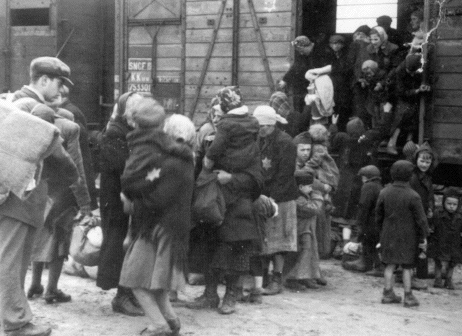
|
|
[IV-2]
Right away it can be seen that the great majority
of those here are mothers with their children.
Explanation:
From 1941, the Jewish men between 21 and 45 (and
even older) were congregated into forced labor
detachments that were "assigned," almost
exclusively, to Ukraine for de-mining the fields
behind the battlefront lines. Because of this, the
entire responsibility in running a family in ghetto
and during deportation all away to the gas chamber
were left on the shoulders of our "kind and holy"
mothers.
(The
Original Text in Romanian)
Dintr-o
singura privire se poate constata ca marea
majoritate a celor ce coboara din vagoane o
reprezinta mamele si copiii.
Explicatia:
incepand cu anul 1941 adultii si barbatii evrei
intre 21 si 45 de ani (chiar si mai in varsta) au
fost concentrati in detasamente de munca fortata
"trimise," aproape in totalitate, in Ucraina sa
demineze cimpurile de lupta din spatele liniilor de
front. Asa se face ca intreaga grija si
responsabilitate pentru viata fiecarei familii in
ghetou si pe timpul deportarii, pana la intrarea in
camera de gazare, a cazut pe umerii "blandelor si
sfintelor" noastre mame.
|
|
 For
the Danish
translation
[Dansk
oversættelse],
please
click in on the icon at left.
For
the Danish
translation
[Dansk
oversættelse],
please
click in on the icon at left.
|
|
 For
the Dutch
translation
[Nederlandse
vertaling],
please
click in on the icon at left.
For
the Dutch
translation
[Nederlandse
vertaling],
please
click in on the icon at left.
|
|
 For
the French
translation
[traduction
française],
please
click in on the icon at left.
For
the French
translation
[traduction
française],
please
click in on the icon at left.
|
|
 For
the German
translation [Deutsche
übersetzung],
please
click in on the icon at left.
For
the German
translation [Deutsche
übersetzung],
please
click in on the icon at left.
|
|
 For
the Hungarian
translation
[Magyar
fordítás],
please
click in on the icon at left.
For
the Hungarian
translation
[Magyar
fordítás],
please
click in on the icon at left.
|
|
 For
the Italian translation
[traduzione
italiano],
please
click in on the icon at left.
For
the Italian translation
[traduzione
italiano],
please
click in on the icon at left.
|
|
 For
the Polish
translation [wersja
polska],
please
click in on the icon at left.
For
the Polish
translation [wersja
polska],
please
click in on the icon at left.
|
|
 For
the Russian translation
[
For
the Russian translation
[ ],
click on the icon at left. ],
click on the icon at left.
|
.
|
|
.
|

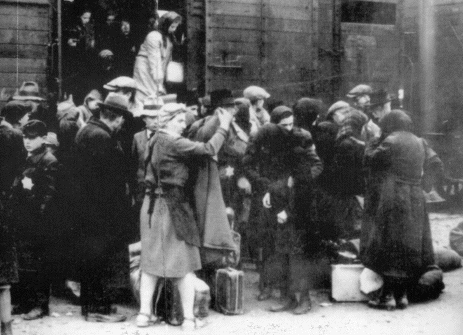
|
|
[IV-3]
In spite of the fact that innumerable times the
order "Alles dort lassen" (everything stays
in the cars) has been given, some, as we can see,
have disembarked carrying small pieces of luggage
or bags. The SS-men made believe that they were not
seeing. The important thing for them was that
everything to go as smoothly and, especially, as
rapidly as possible so to prevent any panic,
yelling, and crying, any altercation or violent
confrontation.
(The
Original Text in Romanian)
Desi
s-a repetat de zeci de ori comanda "Alles dort
lassen", totul ramane in vagoane, cativa, dupa cum
se vede, au coborat cu cate un geamantanus ori
sacosa.SS-istii se faceau ca nu observa. Important
pentru ei era ca totul sa se desfasoare cat mai
rapid si, mai ales, sa previna, sa evite cu orice
pret panica, tipetele si plansetele, orice
altercatie sau confruntare violenta.
|
|
 For
the Danish
translation
[Dansk
oversættelse],
please
click in on the icon at left.
For
the Danish
translation
[Dansk
oversættelse],
please
click in on the icon at left.
|
|
 For
the Dutch
translation
[Nederlandse
vertaling],
please
click in on the icon at left.
For
the Dutch
translation
[Nederlandse
vertaling],
please
click in on the icon at left.
|
|
 For
the French
translation
[traduction
française],
please
click in on the icon at left.
For
the French
translation
[traduction
française],
please
click in on the icon at left.
|
|
 For
the German
translation [Deutsche
übersetzung],
please
click in on the icon at left.
For
the German
translation [Deutsche
übersetzung],
please
click in on the icon at left.
|
|
 For
the Hungarian
translation
[Magyar
fordítás],
please
click in on the icon at left.
For
the Hungarian
translation
[Magyar
fordítás],
please
click in on the icon at left.
|
|
 For
the Italian translation
[traduzione
italiano],
please
click in on the icon at left.
For
the Italian translation
[traduzione
italiano],
please
click in on the icon at left.
|
|
 For
the Polish
translation [wersja
polska],
please
click in on the icon at left.
For
the Polish
translation [wersja
polska],
please
click in on the icon at left.
|
|
 For
the Russian translation
[
For
the Russian translation
[ ],
click on the icon at left. ],
click on the icon at left.
|
.
|
|
.
|

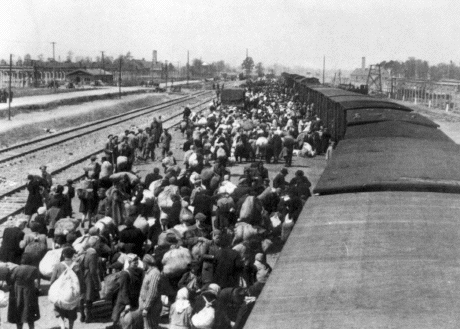
|
|
[IV-4]
General view of the "Death Ramp" when the
evacuation of an entire train was complete. At the
horizon, further back in the picture, we can see
two buildings (on the left and on the right of the
railroad tracks), each having a tall chimney. Those
were the crematoria II and III.
(The
Original Text in Romanian)
Vedere
generala a "Rampei Mortii" in momentul cand
coborarea din vagoane a unui intreg transport este
pe terminate. La orizont se vad doua cladiri (in
dreapta si stanga liniilor ferate) cu cate un cos
inalt. Sunt crematoriile II si III.
|
|
 For
the Danish
translation
[Dansk
oversættelse],
please
click in on the icon at left.
For
the Danish
translation
[Dansk
oversættelse],
please
click in on the icon at left.
|
|
 For
the Dutch
translation
[Nederlandse
vertaling],
please
click in on the icon at left.
For
the Dutch
translation
[Nederlandse
vertaling],
please
click in on the icon at left.
|
|
 For
the French
translation
[traduction
française],
please
click in on the icon at left.
For
the French
translation
[traduction
française],
please
click in on the icon at left.
|
|
 For
the German
translation [Deutsche
übersetzung],
please
click in on the icon at left.
For
the German
translation [Deutsche
übersetzung],
please
click in on the icon at left.
|
|
 For
the Hungarian
translation
[Magyar
fordítás],
please
click in on the icon at left.
For
the Hungarian
translation
[Magyar
fordítás],
please
click in on the icon at left.
|
|
 For
the Italian translation
[traduzione
italiano],
please
click in on the icon at left.
For
the Italian translation
[traduzione
italiano],
please
click in on the icon at left.
|
|
 For
the Polish
translation [wersja
polska],
please
click in on the icon at left.
For
the Polish
translation [wersja
polska],
please
click in on the icon at left.
|
|
 For
the Russian translation
[
For
the Russian translation
[ ],
click on the icon at left. ],
click on the icon at left.
|
.
|
|
.
|

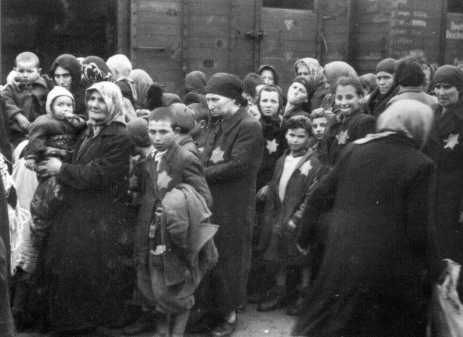
|
|
[IV-5]
On June 9, 1944, in front of an emptied railroad
car, exactly as the one seen here, I was there with
my family. Squashed one into another, nervously, we
were eager to know: Where we are? What they intend
to do with us? What fate awaits us?
.With
tremendous apprehension, we were listening to the
first words addressed to us since our arrest and
forced entry into the ghetto. The monologue that
was being addressed to the newcomers sounded like
this:
Gentlemen
and Ladies,
We
know that you are very tired, that you had a
very long and exhausting journey. Neither food
nor water was plentiful. We are sorry, but this
is not our fault. Now, that is behind you. We
will put you into a Camp. Those who are able
will work. All will live in normal
conditions.
We
are sorry that we have to give you some bad
news. To the Camp, where you would live and
work, are some 3 km and so happen that just
today we do not have transportation. Thus, we
are asking now that:
All
females, mothers with their children no older
than 14, all men sick or disabled to go to
the left.
The
rest that are able to work, and thus able to
walk to the Camp, to stay put on the right of
the ramp.
After
the inhuman crowding in the train, after the hunger
and the thirst that tormented us during the journey
from the Ghetto to the Birkenau , after the fear
and desperation that overwhelmed all of us and in
particular our mothers, the surprising "monologue"
of "understanding and kindness" gave us some
hope.
This
is how it happened in less than one hour, in tens
of minutes, families were separated forever one
from another.
(The
Original Text in
Romanian)
In
ziua de 9 iunie 1944, in fata unuia dintre
vagoanele golite axact ca cele din fotografie ma
aflam si eu impreuna cu familia mea. Ingramaditi
unii in altii, agitati si nerabdatori sa aflam unde
suntem?, ce vor sa faca cu noi? Ce soarta ne
asteapta? Am incremenit de incordarea cu care
ascultam primele cuvintele normale, firesti care ni
se adresau prima oara din momentul arestarii
noastre pentru a fi ghetoizati. Monologul ce se
adresa noilor veniti suna asa:
Domnilor
si Doamnelor,
Stim
ca sunteti foarte obositi, ca ati avut o
calatorie lunga si chinuitoare. Nici hrana nici
apa n-au fost indestulatoare. Ne pare rau, nu
este insa vina noastra. Acum insa s-a terminat.
Veti fi introdusi intr-un lagar. Cei apti de
munca vor lucra. Cu totii veti trai in conditii
normale.
Ne
pare rau insa ca suntem nevoiti sa va dam si o
veste proasta. Pana la lagarul in care veti trai
si munci mai sunt vreo 3 km si tocmai astazi
n-avem suficiente mijloace de transport. Asa ca
va rugam:
Toate
femeile, toate mamele impreuna cu copiii pana
la 14 ani, toti batranii, bolanvii si
invalizii sa treaca in stanga.
Toti
cei care sunt apti de munca, deci se pot
deplasa pe jos, sa ramana pe loc, in dreapta
rampei.
Dupa
inghesuiala inumana din vagoane , dupa foamea ai
setea ce ne-au chinuit pe drumul din ghetou si pana
la Birkenau, dupa spaima si disperarea ce ne
cuprinsese pe toti si mai ales pe mamele noastre,
"monologul" neasteptat de "intelegator si
binevoitor" ne-a redat un pic de
speranta.
Asa
se face ca prima si teribila ruptura a familiilor,
despartirea pe veci a unora de ceilalti s-a facut
in mai putin de o ora, in cateva zeci de
minute.
|
|
 For
the Danish
translation
[Dansk
oversættelse],
please
click in on the icon at left.
For
the Danish
translation
[Dansk
oversættelse],
please
click in on the icon at left.
|
|
 For
the Dutch
translation
[Nederlandse
vertaling],
please
click in on the icon at left.
For
the Dutch
translation
[Nederlandse
vertaling],
please
click in on the icon at left.
|
|
 For
the French
translation
[traduction
française],
please
click in on the icon at left.
For
the French
translation
[traduction
française],
please
click in on the icon at left.
|
|
 For
the German
translation [Deutsche
übersetzung],
please
click in on the icon at left.
For
the German
translation [Deutsche
übersetzung],
please
click in on the icon at left.
|
|
 For
the Hungarian
translation
[Magyar
fordítás],
please
click in on the icon at left.
For
the Hungarian
translation
[Magyar
fordítás],
please
click in on the icon at left.
|
|
 For
the Italian translation
[traduzione
italiano],
please
click in on the icon at left.
For
the Italian translation
[traduzione
italiano],
please
click in on the icon at left.
|
|
 For
the Polish
translation [wersja
polska],
please
click in on the icon at left.
For
the Polish
translation [wersja
polska],
please
click in on the icon at left.
|
|
 For
the Russian translation
[
For
the Russian translation
[ ],
click on the icon at left. ],
click on the icon at left.
|
.
|
 . .

|
.
|